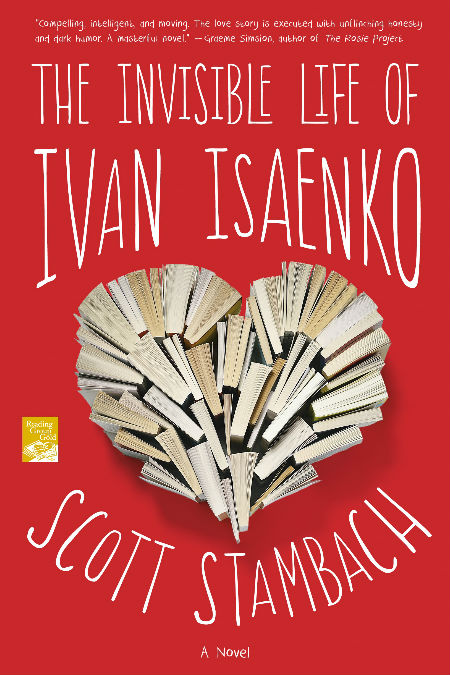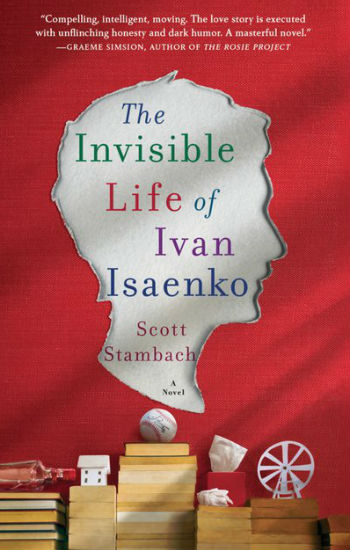
We are all, for better or worse, heavily influenced by the environments in which we grow up.
Whether we remain captive to those influences is another matter entirely and the subject of an entirely different article possibly; but suffice to say, what happens to us in our formative years plays a significant part in who we become and how we see the world around us.
That this is so is abundantly clear early in Scott Stambach‘s evocatively powerful debut powerful The Invisible Life of Ivan Isaenko which tells the alternately humourous and heartbreaking take of a 17-year-old Belorussian boy with severe deformities caused by his parents’ proximity to Chernobyl and it still attendant, malevolently radioactive fingerprint, who has spent his entire life in the Mazyr Hospital for Gravely Ill Children.
Unsure of his exact parentage, only that he wasn’t wanted by whoever gave birth to him – he endearingly understands on a rational level that missing both legs, an arm and being misshapen in other ways would engender this response but deep down of course like anyone he is hurt by the rejection (not that his near-constant pluckish bravado would ever allow him to admit to such a thing – Ivan is the longest-serving resident of the hospital, a place which he inhabits with a buoyant spirit, a quest for knowledge and understanding and an unwillingness to set forth outside the doors of the facility.
“I have nothing to compare my hospitalities to, but from what little I know of the outside world, I am fairly certain that my comrades and I live in hell. For most of us, the hell is in our bodies; for others, the hell is in our heads. And there is no mistaking that, for each of us, hell is in the empty, clinical, perfectly adequate, smudgy, off-white brick walls that hold us in here.” (P. 21)
This is his world, one he feels imprisoned by in many respects but which he has been conditioned to see as the sum total of his existence, a palpable prison of the emotions and the mind that he endlessly messes with via snarky wit and a seditious attitude that always seeks new and inventive ways to subvert the system.
And subvert it he does but The Invisible Life of Ivan Isaenko – and he is all but invisible to everyone outside and inside the facility save for Nurse Natalya who treats him like the son she never had – is not some chirpy, adventure-filled lark of one young man bravely and cheekily taking on the establishment.
Certainly there are elements of that, and Stambach does an impressive job of portraying Ivan’s inspite-of-the-odds impish garrulousness, but this lovable protagonist is a fully well-rounded character who is as weighed down by his limited life as he challenged by the endless numbers of books he reads, all of which, along with sleuthing of the most entrenched kind, are a nod to Ivan’s searing intelligence and capacity for reason even in the face of a world that has sought to constrain and hide him away.

It is the arrival of the gravely-ill Polina, a recent orphan dying of leukemia, who comes armed with a fortified attitude to her newly-vulnerable life and a brazen wit and intelligence, every bit the equal of Ivan, that sets the cat among Ivan’s very settled, though always agitated, pigeons.
He is intrigued and entranced by her which means, of course, that he treats her with complete rudeness and disdain, a means of social interaction that he reaily admits is not ideal, the product of seeing everyone except for his dear Nurse Natalya as some kind of, literally, institutional threat.
Eventually though he and Polina connect, the product not so much of a heart-meltingly sweet “meet cute” – romantic comedy parlance for the moment when two people destined to be together meet; *spoiler alert* this is not a romantic comedy though it is often blackly funny – but simply pragmatic need – he needs an actual friend and she needs someone she can unburden herself to as she undergoes rigorous and ultimately fruitless treatment for her cancer.
Much like The Fault in our Stars, but far darker and less hopeful in some ways given that the resources available to people to Ivan and Polina do not come remotely close to matching their aspirations or needs, The Invisible Life of Ivan Isaenko is about what happens in the overlooked places of life, places still inhabited by some people but overlooked often by the wider world.
“Nurse Natalya, of course, was thrilled by our brewing courtship and did everything possible to cultivate it. She raided the homes of her relatives for old Russian games. Then she would secretly wheel us out to the Main Room after lights-out and let us play unchaperoned. Looking back through diminishing vodka eyes, these nights seem so perfectly surreal. Reader, in that place, at that time, Polina wasn’t dying, and I wasn’t a mutant. We shed our bodies and met in another place.” (P. 154)
Alternately brilliantly hilarious and heartbreakingly bleak and sad – how can it not be since death and deprivation are constant companions despite Ivan and Polina’s efforts to push them away – The Invisible Life of Ivan Isaenko is deeply insightful, unendingly poignant and brusquely realistic without once being anything less than immensely emotionally-resonant.
This is life stripped of all its artifice and conceit, and while Ivan and Polina don’t dispense with these artifacts of human interaction completely since they are never less than wholly and wonderfully human and we like our social bells and whistles no matter who or where we are, is a transcendental beauty to their honestly heartfelt experiences of life at the pointy end.
Throughout its exquisitely real and never less than simultaneously joyful and agonising length, The Invisible Life of Ivan Isaenko is magnificently rich and true, voiced by a writer who intimately understands and flawlessly conveys that people are people no matter where they are or whatever the resources at hand.
Tempting though it must have been to airbrush Ivan, and to a lesser extent Polina in saintly, Pollyanna shades and tones, Stambach is never once anything other than profoundly honest about what they are up against; even for all this unadorned truthfulness about the good and the bad, the fateful and hopeful aspects of life on the margins, he imbues this beautifully moving book with an intimate belief that even in the most dire of circumstances, everything that is wonderful about being alive and being human can still find expression.
And we, those whom Ivan, desperate to ensure that his beloved Polina is never forgotten as he transcribes his and her life stories, endearingly calls “Readers”, are all the better for witnessing it.